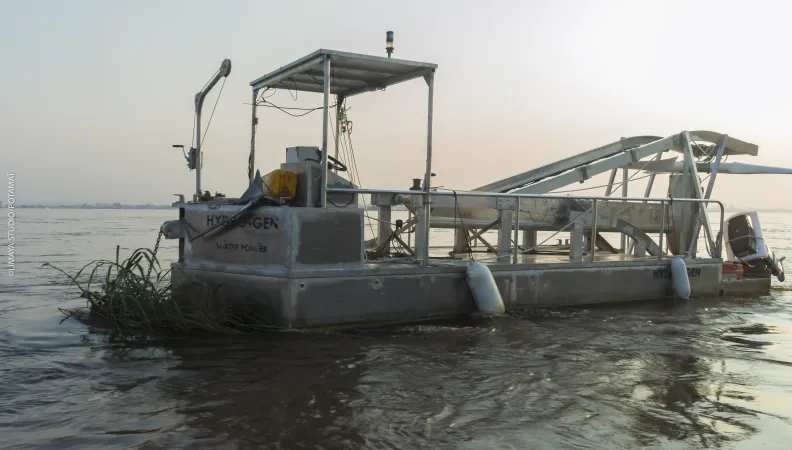Share the page
Ensure access to renewable electricity and essential services through a floating tidal stream turbine (ESU)
Project


-
Project start date
-
Status
Completed
-
Estimated date of project termination
-
-
Project financing date
-
-
Financing duration
-
4 years
-
Type of program
-
FFEM
-
Global financing amount
-
€ 439 000
-
FFEM financing amount
-
€ 132 000
-
Project lead member institution(s)
-
French Ministry of Economy and Finance
-
Location
-
Loubassa, République du Congo
-
Partners
-
L’Aquaphile, participatory financing
-
Beneficiaries
-
L’Aquaphile, Pot@maï, Aide à l’enfance



600 million people in Africa have no access to electricity. To combat this energy insecurity while reducing greenhouse gas emissions, the FFEM is supporting a pilot project to install a tidal stream turbine in the Congo River.
Context
Sub-Saharan Africa has an electrification rate of 31% which falls to just 12% in rural areas. Decentralised rural electrification is sustainable and is critical to the continent’s long-term development.
At the heart of central Africa, the Congo River is a precious source of drinking water as well as reliable energy: numerous locations meet the required criteria for tidal stream power generation. The FFEM is supporting a pilot project being led by a partner consortium comprising L’Aquaphile, Pot@maï and Aide à l’Enfance which aims to test the operation of floating tidal stream turbines along this river. The objective: to provide the village of Loubassa with sustainable energy and build an economic model based on the sale of essential services such as drinking water, refrigeration for food and medicine storage and the development of economic activities.
Description
The project has four components:
- Undertaking a feasibility study before designing the essential services unit, selecting the most viable model for the tidal stream turbines and equipment best suited to the needs of the local people.
- Launching a distributed essential services unit at Loubassa; the unit will be built in France, then installed with the equipment in the Congo.
- Ensuring the proper management of the essential services unit, through the recruitment and training of managers while also setting up and monitoring the micro-business to run the unit.
- Evaluating and sharing the results, through communication materials and the production of an environmental and socio-economic impact study.
Outcomes
- Significant reduction of greenhouse gas emissions by replacing power generators with low-carbon technology.
- Improving the living conditions of the Loubassa community. People will have access to the following services: a purification unit to render the river water drinkable, cold storage, IT equipment, battery charging, flour mill, cereal grinder.
- Creation of both one-off and long-term employment and the development of new economic activities to leverage local expertise.
Innovative and exemplary features
The innovative nature of this project, which benefits from the FFEM’s Innovation Facility for the Private Sector (FISP), derives essentially from the Hydro-Gen technology developed by L’Aquaphile. The Hydro-Gen tidal stream generator is designed for less technically-resourced countries and isolated sites. It can be operated by a single person, without any external assistance.
The choice of partnership between Pot@maï for the installation of the energy services centre and creation of the management micro-business, and Aide à l'enfance to train the local people, contributes to the originality of this approach and may be reproduced in other villages.
Sustainable Development Goals
ODD11 Sustainable cities and communities

ODD13 Climate action

ODD17 Partnerships for the goals



